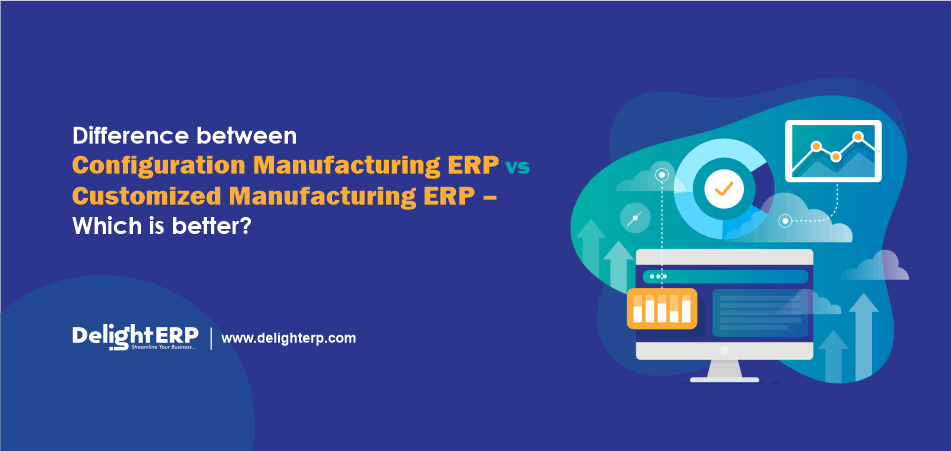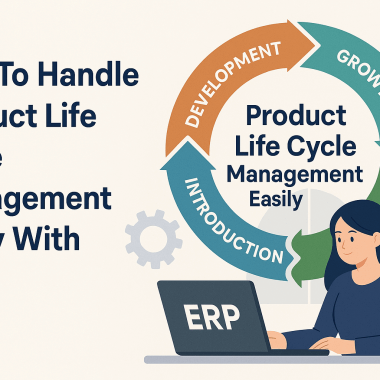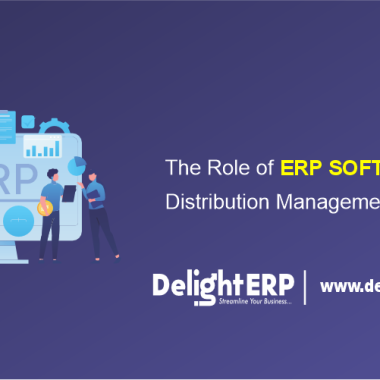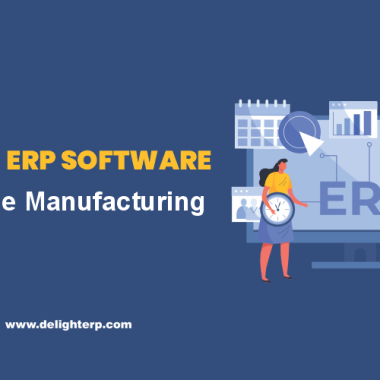Introduction
Manufacturing ERP Software is necessary for many manufacturing companies. Manufacturing ERP software is a comprehensive solution for materials management and production planning. Without an ERP system, your organization can suffer from inefficient operations, costly and outdated systems, and lost customer opportunities.
Manufacturers are more under pressure than ever from a confluence of demand to increase their product’s demand from global competition, difficult supply chain system, and rising costs to increased customer demands. To increase profits, manufacturers have pressure to decrease costs and be more responsive- so there is no room for mistakes.
Why do Industries need to use Manufacturing ERP Software?
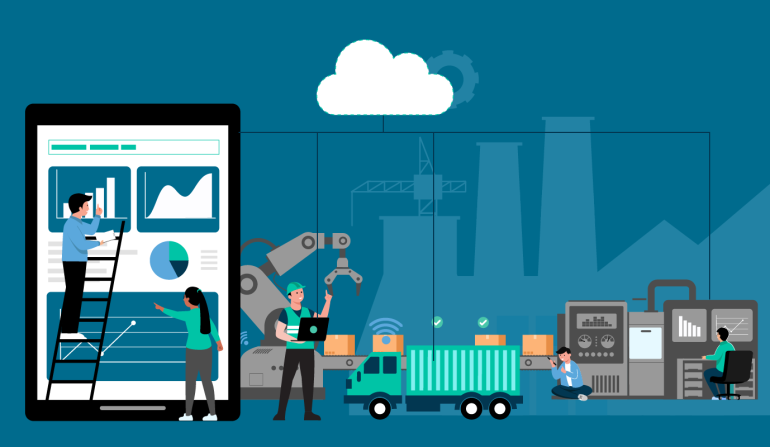
You face difficulties like:
- You face problems in time monitoring and coordinating the production process.
- You want to decrease internal costs.
- A problem in improving the sales process.
- You struggle to handle both its standard and technical contract manufacturing.
- Manufacturers didn’t get essential information in real time.
- You want to improve your customer service.
For adopting ERP software for your organization, you would have heard about Configuration Manufacturing ERP and Customization Manufacturing ERP. Enterprises have been struggling with the question, “Should I customize the manufacturing ERP or configure the manufacturing ERP based on our requirements?” Throughout the ERP implementation planning, you have to choose one.
Every organization operates differently and has its own unique set of processes and workflows. This means they would require an ERP system that will suit their way of functioning and would need some sort of configuration or customization depending on the scope of change.
Though the difference between configuration and customization is the scope of work, costs, training, and time taken to modify the ERP based on the requirement. What works for bigger enterprises, won’t help for small and medium and vice versa.
Now let us look into both concepts and understand them:
Difference between Configuration Manufacturing ERP vs Customized Manufacturing ERP – Which is better?
ERP Configuration
ERP Configuration permits enterprises to change settings within the ERP based on their requirement without changing the source code. The settings include languages, currencies, time zones, industry-specific business workflows and processes, financial reports, data analytics, business intelligence, etc.
These configuration settings are ready-made within the ERP and are a part of the source code. According to needs, enterprises can adjust the settings and configure them as and when they consider necessary. Industries can personalize the ERP for each department or a business function or an entire business unit.
Following are the examples:
ERP Personalization
- Make use of a browser-based interface to publish the configurator to dealers and end-users.
- Personalization of reports, trends, field labels data analytics, etc.
- Plan sequence of questions, color schemes, screen layouts, etc.
- Creation of employee roles and departments specific to the enterprise.
Workflow Automation
- Initiate discount rules based on customer types, item types, etc.
- Build rules and formulas for generating manufacturing BOMs based on configuration.
- Create multi-level BOMs and routings automatically.
- Take advantage of an easy-to-use scripting engine to create highly complex rules.
- Based on customer types, define security and accessibility rules.
- Set up rules to perform particular automated functions.
- Plan pricing rules for dealers, option pricing, and end users.
And more.
ERP configuration features can be improved with each software upgrade, thereby adding more features and improvements within the source code itself. Earlier configuration settings remain unaltered by a software upgrade, unlike ERP customization which has the possibility of being overwritten by an upgrade.
However, ERP configuration can be a time-consuming process as the ERP dealer has to understand client requirements and accordingly modify the settings/configurations to suit them.
The configurations will have to go through intensive testing and enough training should be given to the IT team so that they can manage and maintain the settings. As compared to ERP customization, ERP configuration is a one-time task.
Advantages:
- No changes involve to the ERP source code.
- Cost-effective as compared to ERP customization.
- ERP configuration can be improved and altered with each software upgrade.
- Customization scope can be included as configuration settings.
- Involves one-time configuration to the ERP based on client requirements.
Disadvantages:
- Third-party and internal application integration cannot be met with ERP configuration and it requires customization.
- Not all requirements can be included in ERP configuration.
- Additional modules cannot be added through ERP configuration and require customization.
ERP Customization
An ERP customization operates specifically to enhance business processes. It is customized when an enterprise wants to add or alter modules/functionalities based on their requirements, apart from what the standard version has to offer. It also includes integrating with third-party or internal applications to improve its capabilities and provide a comprehensive, automated solution.
ERP customization includes working at the source code level and therefore involves comprehensive planning. The whole process involves understanding the requirements in detail, think a customization plan, development, intensive testing, final implementation, training, and bug fixes.
It includes immense time and cost depending on the scope of changes and the enterprise size. The larger the enterprise, the more requirement and time, and costs are taken to customize the ERP.
Advantages:
- Gives the freedom to add modules and functionalities to standard ERP products.
- Provides the flexibility to meet an enterprise’s operational requirements.
- ERP vendors offer low-code customization which can mitigate most of the cons of ERP customization.
- Unique to enterprise workflows & business processes
Disadvantages:
- Need a skilled development team with detailed technical, domain, and ERP knowledge.
- Development time and cost increase depending on organization size.
- No or limited support from the ERP vendor for customized modules
- Further customization is required for future needs.
- It can cause delays and shoot off the budget.
- Requires robust maintenance & internal resources
ERP dealers offer low-code customization which mitigates most of the limitations of ERP customization. Low-code customization means that enterprises can select to customize a certain module or functionality with restricted development efforts without influencing other modules or customization.
So this avoids the possibility of overwriting the entire customization in case of an upgrade. Low-code customization ensures that enterprises can save on costs and time as development included is minimal.
Developing and implementing customized ERP software for manufacturing enables companies to enhance processes related to product lifecycle management and accelerate the production cycle. With a customized ERP system, you can get a centrally managed software solution to gain control of your manufacturing and production processes.
It helps manufacturers to track and manage on-site activities while automating difficult processes like product planning and task scheduling. It provides optimum transparency and complete traceability for tracking on-site activities.
Having a fully-integrated ERP system at your disposal is beneficial to efficiently manage a host of manufacturing activities from the procurement of raw materials to processing finished products and managing shipments. It is important from the standpoint of manufacturing businesses.
Properly managing inventory levels is difficult to prevent instances of stock outages and overstocking with features such as auto-replenishment and purchase management. The inventory modules help manufacturing companies gain real-time insights into warehouse data and help them proactively manage stock movements throughout the production cycle.
Customized ERP solution for manufacturing process management provides access to fully customized modules for logistics and supply chain management. This module enables enterprises to effectively track and monitor their activities, the logistics module is responsible for improved freight tracking, shipping, and vehicle routing.
Here, this module gives you access to features like shipping, purchasing, inventory management, electronic data interchange (EDL), and order management. Other important features include material requirement planning (MRP), RFID, asset tracking, orders/returns management, etc.
ERP system for manufacturing development gives you access to dedicated modules for sales and purchasing management. These modules are designed to streamline a host of business processes like managing sales, orders, supplier listings, and quotation requests. It gives real-time stock updates to keep warehouse managers informed of their stock levels at any given time period.
Choosing between Configuration Manufacturing ERP Software and Customized Manufacturing ERP Software
It is difficult to choose between configuration manufacturing ERP and customized manufacturing ERP. It depends on the enterprise according to its needs. Many factors are involved when deciding and implementing an ERP like enterprise size, industry type, number of subunits/branches, number of stakeholders, business processes, existing software used, budget, etc. Depending on these factors, manufacturing industries can choose which to implement.
ERP configuration mostly suits small and medium enterprises. It doesn’t hold for niche industry segments that belong to the SME group. They may need customization to suit their operations. Also same applies to large enterprises that most of the time, would need an ERP customization. However, depending on their industry type and operations, some might use configuration.
Therefore, there are no rules that a particular setting fits a particular industry or enterprise. Before deciding, enterprises need to understand properly what they want and accordingly take an informed decision. The result of a wrongly implemented ERP is high and costs high on operations, revenue, and profitability.
Conclusion
Delight ERP is one of the best ERP software development company in Rajkot, Gujarat, India. Delight ERP Software is a important cloud-based solution. It provides configuration ERP and Customized ERP for manufacturing industries. It also provides Production Management ERP software which helps manufacturers with production systems. You can configure or customize the ERP based on your requirements.

